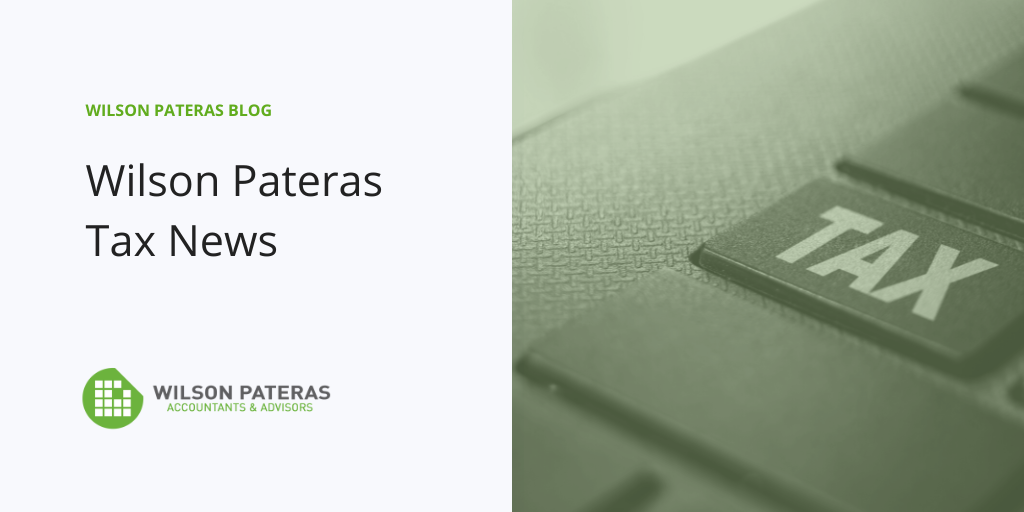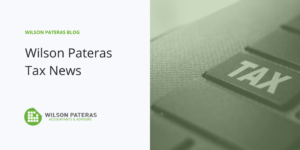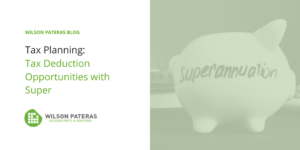
Our September 2022 monthly edition of Tax News contains information on a number of recent developments, including:
- More COVID-19 business grants are now tax-free
- ATO reminder about appointing an SMSF auditor
- Super comparison tool updated
- Small business tax incentives back on the table
- Rental properties and second-hand depreciating assets
More COVID-19 business grants are now tax-free
The Federal Government has expanded the list of State and Territory COVID-19 grant programs that may be tax-free to eligible businesses.
A State or Territory Government COVID-19 grant payment will generally be tax-free if:
- the payment is received under a grant program that is formally declared to be an eligible program;
- the recipient carried on a business and had an aggregated turnover of less than $50 million in the income year the payment was received, or in the previous income year; and
- the payment was received in the 2021 or 2022 income year.
The following Victorian and ACT COVID-19 grant programs have recently been declared as eligible grant programs for these purposes:
- Business Cost Assistance Program Round Two – Top Up (Victoria).
- Business Cost Assistance Program Round Three (Victoria).
- Business Cost Assistance Program Round Four (Victoria).
- Business Cost Assistance Program Round Four – Construction (Victoria).
- Business Cost Assistance Program Round Five (Victoria).
- Commercial Landlord Hardship Fund 3 (Victoria).
- Impacted Public Event Support Program Round Two (Victoria).
- Licensed Hospitality Venue Fund 2021 – Top Up Payments (Victoria).
- Live Performance Support Program (Presenters) Round Two (Victoria).
- Live Performance Support Program (Suppliers) Round Two (Victoria).
- HOMEFRONT 3 (ACT).
ATO reminder about appointing an SMSF auditor
The ATO is reminding trustees of self-managed super funds (‘SMSFs’) that they need to appoint an approved SMSF auditor no later than 45 days before the lodgment of their fund’s SMSF annual return (for example, for the 2022 income year).
In particular, the ATO says:
“Don’t risk approaching an auditor the day before you need to lodge as it will result in an overdue lodgment.
Approved SMSF auditors are an important part of your lodgment and reporting obligations.
They review your fund’s financial statements and make sure you’re complying with super law.”
Importantly, an audit is required even if no contributions or payments were made to or from the SMSF in the financial year.
Super comparison tool updated
The YourSuper comparison tool helps individuals compare MySuper products and choose a super fund that meets their needs.
It ranks the performance of these products by fees and net returns.
Each year, the Australian Prudential Regulation Authority (‘APRA’) assesses the performance of each MySuper product, and this information is displayed in the comparison tool. Updated information for the 2022/23 year is now available.
The comparison tool provides one of the following results for each MySuper product:
- Performing – the product has met or exceeded the performance test benchmark.
- Underperforming – the product has not met the performance test benchmark.
- Not assessed – the product had less than five years of performance history and has not been rated by APRA.
Individuals who are members of underperforming MySuper products will receive correspondence to notify them of the underperforming status.
Individuals can access a personalised version of the tool which allows them to view and compare their existing MySuper products by doing the following:
- Log in to ATO online services through myGov.
- Go to the ‘Super’ drop-down menu and select ‘Information’, then select ‘YourSuper comparison’.
To access a non-personalised version of the tool (without logging into myGov), visit ato.gov.au/yoursuper
Small business tax incentives back on the table
The Albanese Government has confirmed its commitment to implementing two tax incentives aimed at supporting small businesses to train and upskill employees, and improve their digital and tech capacity.
The Technology Investment Boost and the Skills and Training Boost were announced in the 29 March 2022 Federal Budget but remain unlegislated.
Small businesses with an annual turnover of less than $50 million will be able to claim a ‘bonus’ 20% deduction for eligible expenditure on:
- external training of employees until 30 June 2024; and
- the uptake of digital technologies until 30 June 2023.
- The incentives will be backdated to 29 March 2022.
These incentives are not yet law. If you have spent, or are considering spending, on training or digital technology, please contact our office for an update.
Rental properties and second-hand depreciating assets
The ATO is reminding taxpayers that have a residential rental property, to take care when making claims for ‘second-hand depreciating assets’ used in their properties.
In most cases, these are items that existed in the taxpayer’s property when they purchased it, or were in their private residence (which they later rented out), such as:
- flooring and window coverings;
- air conditioners, washing machines, alarm systems, spas, pool pumps; and
- items used for both the rental property and the taxpayer’s own home.
Since 1 July 2017, taxpayers generally cannot claim the decline in value of second-hand depreciating assets (some limited exceptions do apply).
However, this rule does not apply to a property that was rented out before this date, or if it is newly built or substantially renovated (conditions apply).
If you have a residential rental property, to help us get your claim right, please answer the following:
- When did you purchase the property?
- Was it a new or existing build?
- Did you live in the property before renting it out?
- When did you start renting the property?
- Was the asset already in the rental property when you bought it?
- Is the property used for business purposes?
This content has been prepared by Wilson Pateras to further our commitment to proactive services and advice for our clients, by providing current information and events. Any advice is of a general nature only and does not take into account your personal objectives or financial situation. Before making any decision, you should consider your particular circumstances and whether the information is suitable to your needs including by seeking professional advice. You should also read any relevant disclosure documents. Whilst every effort has been made to verify the accuracy of this information, Wilson Pateras, its officers, employees and agents disclaim all liability, to the extent permissible by law, for any error, inaccuracy in, or omission from, the information contained above including any loss or damage suffered by any person directly or indirectly through relying on this information. Liability limited by a scheme approved under Professional Standards Legislation, other than for the acts or omissions of financial services licensees.





